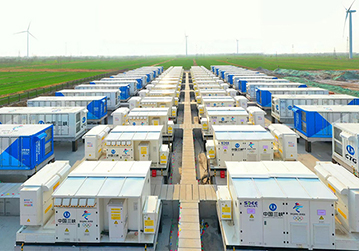
The energy storage market, especially the lithium-ion battery energy storage market, is considered to have a broad market space and diverse usage scenarios. Lithium-ion battery energy storage technology has the advantages of high efficiency, flexibility of use, fast response and speed, and gradually occupies an increasingly important position in the electric energy storage market.
The composition of the energy storage system mainly includes battery system, PCS converter system, box transformer system, station transformer system, energy management system and monitoring system (SCADA system), primary and secondary cables, etc.
Lithium-ion battery energy storage technology mainly refers to the storage of electric energy. The stored energy can be used as emergency energy, and can also be used for energy storage when the grid load is low, and output energy when the grid load is high, for peak shaving and valley filling, and to reduce grid fluctuations.
Working principle of lithium-ion battery energy storage power station:
The working principle of emergency lithium-ion energy storage vehicles or megawatt-level fixed energy storage power stations is to directly convert high-power lithium-ion battery packs into single-phase and three-phase AC power through inverters. Normally, you only need to freely choose the charging period to charge the battery pack. When the lithium-ion battery pack is fully charged, it can be called at any time. The energy storage battery is an indispensable energy storage component of the solar photovoltaic power generation system. Its main function is to store the electric energy of the photovoltaic power generation system and supply power to the load when the amount of sunshine is insufficient, at night and in an emergency.
Lithium-ion battery energy storage power stations are generally used in new energy power stations, and are relatively less used in traditional power stations. Due to unstable voltage and uncertain timing of wind and solar power generation, it is more conducive to healthy grid operation to use energy storage power stations as power relays.
According to public data, there are already 20 lithium-ion battery energy storage projects in my country, with a total installed capacity of 39.575MW. Energy storage is one of the important means to solve the intermittent volatility of new energy wind power and photovoltaics, and realize the function of peak shaving and flat valley. Energy storage lithium-ion batteries are also gradually being valued as an emerging application scenario.
Advantages and disadvantages of lithium-ion battery energy storage power stations:
Advantages: It can solve the problem of electric vehicle battery scrapping and reduce the cost of electric vehicles in disguise. It also solves the problem of the utilization of wind and solar power, making wind and wind power turn from garbage power to usable power.
Disadvantages: 1. If the energy storage performance of the battery is degraded and it needs to be recycled, the cost may not be affordable by the industry, so only cascade use of the battery can be considered;
2. Once an accident occurs in a battery energy storage power station, it is a major accident. Everyone knows the results of the previous explosions. The accidents are extremely harmful and destructive to the environment.
Lithium-ion battery energy storage power station application scenarios: energy storage emergency power supply vehicle, energy storage fixed power station, communication backup power supply, etc.
